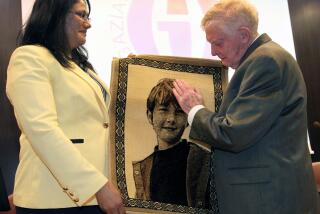We Must Find a Way Soon to Get More Organs Donated
- Share via
On Jan. 4 Felipe Garza Jr., 15, who seemed in good health, precipitously died when a blood vessel burst in his head. A week earlier he had told his mother that he was going to die and that he wanted his heart donated to his very sick friend. His premonition and his wish both came to pass.
The news that Felipe’s heart was donated to his friend, Donna Ashlock, 14, touched us all. The story excites our old-fashioned sense of romance, titillates our desire for mystery and brings us face to face with the merging issues of personal and medical ethics.
Literature, movies and song have always portrayed the sacrificial limits of love. It is heartening that old-time romance and true giving still have a place in a world where narcissism is exalted as a virtue. But is Felipe’s story just another example of that pristine quality of adolescent love? Was Felipe’s premonition an errant childish worry, converted to prophesy by chance? Or can some of us, without the aid of heart monitors and a team of doctors, really sense our imminent death?
Unfortunately, no one records all the premonitions of death that were silenced by continued health. Further, those that are right in their forecast do not live to tell the secret of their extra sense. Death premonitions will probably remain the subject of fairy tales and folk stories.
It is enticing to speculate that Felipe did not merely predict his death, but caused it. Could Felipe, knowing of Donna’s need and having the subliminal or unconscious knowledge of his weakness, accelerate his own death? Did Felipe through an act of will commit a sacrificial suicide?
It is certainly true that modern experimental psychology has shown that people do have some voluntary control over bodily processes that used to be thought of as beyond control. But a close examination of this research indicates that our self-control is feeble indeed. While there’s a long history of case reports of mental suicides, there is still no scientific evidence that our will is that potent. Maybe we hang on to these tales in order to feel mastery over our often-derelict bodily processes.
Regardless of whether Felipe had a true inner vision or a willed death, one fact remains undisputably clear: Donna has a second chance because Felipe cared. Without that caring element, Donna would have been left begging to faceless donors. This raises a critical ethical and legal question: Can the fate of those who need life-saving transplants be left to the vagaries of love, chance or mere indecision?
The sad answer is that loving personal gifts simply cannot meet the growing need for organs for transplantation in this country. The seriousness of the problem led to the enactment of the Uniform Anatomical Gift Act. Although many states have adopted a statute allowing for organ gifts, relatively few people have taken advantage of the opportunity to give. A serious organ shortage still exists. Further, growing medical technology will increase the demand for organs by increasing the effectiveness of transplants.
Most people do not plan on dying, and certainly do not plan on the disposition of their body parts. Given a choice about donating them, most choose not to choose. The prevalent denial of death and our sentimental attachment to our organs makes giving up the body psychologically painful. While we talk of the spirit and the soul, many secretly think that “I am my body.” The idea of having the self carved up is repugnant to many. Existentialists jestingly point out that we think about death as if we will be alive to experience it. This common fantasy and the infusion of our selfhood into the tissues stands in the way of thousands of life-saving organ donations.
The time has come to accept that the Uniform Anatomical Gift Act has failed. We must seek other national solutions. A number of interesting ideas already have been proposed.
Prof. Duke Minier of UCLA Law School has suggested that organs be automatically available for medical use unless the “donor” has previously recorded an objection. This system would bypass denial and place passivity on the side of the gift of life. Others have suggested that organs be treated as property and subject to sale and market forces. One writer has supported a system of forced choice: At some critical time, such as when you receive your driver’s license, you would have to choose whether or not to allow some, or all, of your organs to be used on your death.
Which of these solutions is most practical and, more important, palatable will require a lengthy debate. The debate must start now. There are just not enough people like Felipe Garza Jr. to go around.






